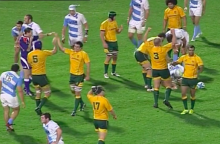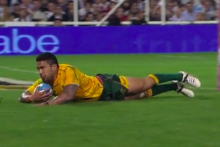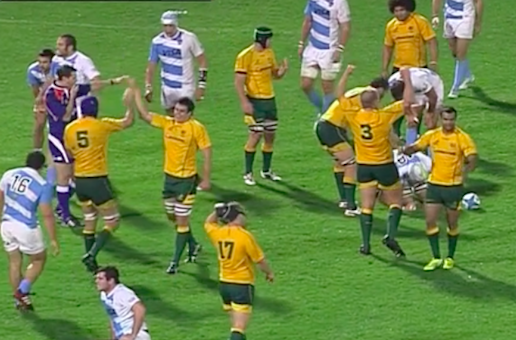
There is now a clear pattern emerging that this generation of young Wallabies is made of the sternest stuff. This gives them the best chance of challenging the All Blacks in England in 2015 for the RWC.
As if forged and then precision cut by laser, this squad emerged and discovered itself in Rosario. I will call them the Rosario 22.
The same thing happened to the Australian cricket team in the late 1980s when they won the 1987 World Cup and then defeated England at home in 1989, both against the odds and under extremely unflattering epithets from the fourth estate.
The Rosario 22 are nothing like the finished article yet. They will struggle against the All Blacks in Brisbane. However, we are at the start of a four-year cycle and RWCs are not won now.
Despite lacking the combined 83 Test caps of supposedly key play makers Barnes (45) and Cooper (38), and the inclusion of inexperienced replacements, there were fewer brainless errors by the Rosario 22: no morale-damaging tweets or television appearances, no fluffed drop-outs, no charged-down kicks, no mindless chip-kicks and no huffing and puffing. This made life so much easier for the Rosario 22.
The Rosario 22 includes twelve players with fewer than 15 Test caps and eleven with fewer than ten.
Seven of the nine backs are babes in both Test caps and age. Harris (three and 24), Cummins (one and 25), Tapuai (two and 23), Phipps (five and 23), McCabe (13 and 24) and Shipperley (two and 21) have fewer than 15 Tests. Sheehan has just three Tests.
Of the 13 forwards, five are babes: Hooper has seven caps and is 21 years old, Timani has seven and is 26, Douglas has two and is 23, Dennis has eight and is 26, and Gill has 3 and is 20.
The misfortune of the injury toll has peeled back the layers and exposed the Rosario 22, thrusting them into international rugby well before their time. As the saying goes, ‘If you’re good enough, you’re old enough’.
They are good enough. They have repeatedly demonstrated the most important ingredient. Whether you call it character, determination, passion, stubbornness or plain youthful naiveté and self-belief, as a team, they give it their best for 80 minutes, no matter what. I ask no more.
The Rosario 22 will get better when they eliminate the inexperience that creates dropped passes, bombed tries, dropped high balls and silly penalties.
This character first arose during the Springboks game in RWC 2011. Everything said that they should have lost that game. Then they gathered their tired bodies and minds together to win five times against Wales, the current European champions in the space of seven months. They achieved this with a lengthening casualty list, a combination of dubious playing tactics and/or lack of attacking cohesion, and some brainless individual player performances on and off the field.
They were outclassed by the All Blacks in both games but tackled to a standstill in both games. They came from behind against the Springboks and the Pumas, kept playing in South Africa even with 14 men and then overcame the passion and atmosphere of Rosario and Roncero’s farewell game, not to mention the phantom laser.
Nathan Sharpe’s passionate and experienced leadership, clearly influenced by his class as an individual, his frequent, painful losses at the Reds and then the Force and his imminent retirement, has been a major factor. Horwill, Genia and Pocock just don’t have Sharpe’s leadership experience. It will come.
The next test of character for the Rosario 22 comes in two weeks against the All Blacks in Brisbane. They probably won’t win but they must play for 80 minutes and build on Rosario.
As soon as possible, Robbie Deans needs to do four things:
1. Anoint The Rosario 22
Anoint this squad as incumbents, not as seat-warmers for the injured. This gives the youngsters more self-belief and motivation and tells the injured stars to return with their A game if they want to keep their Wallabies dream alive.
For example, Mitchell, Tomane, Turner and O’Connor will need to surpass both Shipperley and Cummins for a starting wing position. AAC and Horne will need to oust Tapuai. Pocock will need to dominate Hooper and Gill at the breakdown and around the field to wear the 7 jersey.
In 2013, as the Lions arrive, the Wallabies will have the 20 currently injured, former starting players competing with the Rosario 22 for just 22 places. Expect this rivalry to feed into every one of the 20 Australian derby Super Rugby games in 2013.
2. Develop every player’s individual skill levels
These young players need help to develop into highly skilled players who can perform and execute these skills under intense pressure.

3. Backline Play
The Ioane try against Argentina and Dagg’s try in Sydney destroyed the myth that modern defences are superior to traditional attacks; I emplore Robbie Deans to encourage the return of deceptive and exciting backline play. It is essential to the scoreline, the attendances and the viewership.
4. High Tempo Play
In Rosario, the Wallabies were at their most effective when they played an up-tempo game. Higginbotham hit and bent the line and popped a pass to Sharpe at full pace. No defence can stop this type of attack. Kieran Read’s beautifully timed and brave run last week split the Argentinian defence and created an easy try for Cory Jane.
Let’s hope that the pattern of the past 12 games continues and flourishes.


